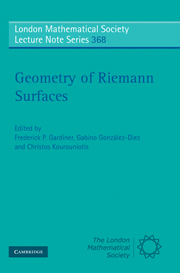Book contents
- Frontmatter
- Contents
- Preface
- Foreword
- Semisimple actions of mapping class groups on CAT(0) spaces
- A survey of research inspired by Harvey's theorem on cyclic groups of automorphisms
- Algorithms for simple closed geodesics
- Matings in holomorphic dynamics
- Equisymmetric strata of the singular locus of the moduli space of Riemann surfaces of genus 4
- Diffeomorphisms and automorphisms of compact hyperbolic 2-orbifolds
- Holomorphic motions and related topics
- Cutting sequences and palindromes
- On a Schottky problem for the singular locus of A5
- Non-special divisors supported on the branch set of a p-gonal Riemann surface
- A note on the lifting of automorphisms
- Simple closed geodesics of equal length on a torus
- On extensions of holomorphic motions—a survey
- Complex hyperbolic quasi-Fuchsian groups
- Geometry of optimal trajectories
- Actions of fractional Dehn twists on moduli spaces
On extensions of holomorphic motions—a survey
Published online by Cambridge University Press: 05 May 2013
- Frontmatter
- Contents
- Preface
- Foreword
- Semisimple actions of mapping class groups on CAT(0) spaces
- A survey of research inspired by Harvey's theorem on cyclic groups of automorphisms
- Algorithms for simple closed geodesics
- Matings in holomorphic dynamics
- Equisymmetric strata of the singular locus of the moduli space of Riemann surfaces of genus 4
- Diffeomorphisms and automorphisms of compact hyperbolic 2-orbifolds
- Holomorphic motions and related topics
- Cutting sequences and palindromes
- On a Schottky problem for the singular locus of A5
- Non-special divisors supported on the branch set of a p-gonal Riemann surface
- A note on the lifting of automorphisms
- Simple closed geodesics of equal length on a torus
- On extensions of holomorphic motions—a survey
- Complex hyperbolic quasi-Fuchsian groups
- Geometry of optimal trajectories
- Actions of fractional Dehn twists on moduli spaces
Summary
Abstract
In this survey article, we discuss some of the main results on extensions of holomorphic motions. Our emphasis is on holomorphic motions over infinite dimensional parameter spaces. The Teichmüller space of a closed set E in the Riemann sphere is a universal parameter space for holomorphic motions of that set. This universal property is exploited throughout the article.
Notation. In this paper we will use the following notations: C for the complex plane, Ĉ for the Riemann sphere, and ∆ for the open unit disk {z ∈ C : |z| < 1}.
Introduction
Motivated by the study of dynamics of rational maps, Mañé, Sad, and Sullivan (in [MSS]) defined a holomorphic motion of a set E in Ĉ, to be acurve φt(z) defined for every z in E and for every t in ∆, such that:
(i) ϕ0 (z) = z for all z in E,
(ii) z ↦ ϕt (z) is injective as a function from E to Ĉ, for each fixed t in ∆, and
(iii) t ↦ ϕt(z) is holomorphic for |t| < 1, and for each fixed z in E.
As t moves in the unit disk, the set Et = ϕt(E) moves in Ĉ. We think of t as the complex time-parameter for the motion. As Gardiner and Keen remark in the introduction in [GK], although E may start out as smooth as a circle and although the points of E move holomorphically, for every t ≠ 0, Et = ϕt (E) can be an interesting fractal with fractional Hausdorff dimension.
- Type
- Chapter
- Information
- Geometry of Riemann Surfaces , pp. 283 - 308Publisher: Cambridge University PressPrint publication year: 2010
- 3
- Cited by

